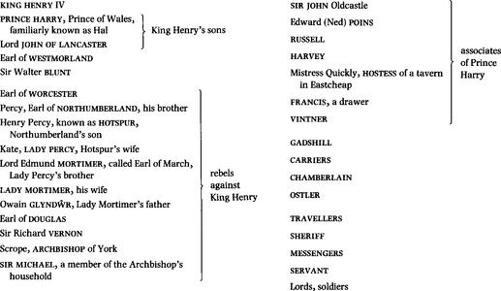1 Henry IV is the first of Shakespeare’s history plays to make extensive use of the techniques of comedy. On a national level, the play shows the continuing problems of Henry Bolingbroke, insecure in his hold on the throne, and the victim of rebellions led by Worcester, Hotspur (Harry Percy), and Glyndwr. These scenes are counterpointed by others, written mainly in prose, which, in the manner of a comic sub-plot, provide humorous diversion while also reflecting and extending the concerns of the main plot. Henry suffers not only public insurrection but the personal rebellion of Prince Harry, in his unprincely exploits with the reprobate old knight, Oldcastle. Sir John has become Shakespeare’s most famous comic character, but Shakespeare shows that the Prince’s treatment of him as a surrogate father who must eventually be abandoned has an intensely serious side.
THE PERSONS OF THE PLAY

The History of Henry the Fourth
1.1 Enter King Henry, Lord John of Lancaster, and the Earl of Westmorland, with other ⌈lords⌉
KING HENRY
So shaken as we are, so wan with care,
Find we a time for frighted peace to pant
And breathe short-winded accents of new broils
To be commenced in strands afar remote.
No more the thirsty entrance of this soil
Shall daub her lips with her own children’s blood.
No more shall trenching war channel her fields,
Nor bruise her flow‘rets with the armed hoofs
Of hostile paces. Those opposed eyes,
Which, like the meteors of a troubled heaven,
All of one nature, of one substance bred,
Did lately meet in the intestine shock
And furious close of civil butchery,
Shall now in mutual well-beseeming ranks
March all one way, and be no more opposed
Against acquaintance, kindred, and allies.
The edge of war, like an ill-sheathèd knife,
No more shall cut his master. Therefore, friends,
As far as to the sepulchre of Christ—
Whose soldier now, under whose blessèd cross
We are impressèd and engaged to fight—
Forthwith a power of English shall we levy,
Whose arms were moulded in their mothers’ womb
To chase these pagans in those holy fields
Over whose acres walked those blessed feet
Which fourteen hundred years ago were nailed,
For our advantage, on the bitter cross.
But this our purpose now is twelve month old,
And bootless ’tis to tell you we will go.
Therefor we meet not now. Then let me hear
Of you, my gentle cousin Westmorland,
What yesternight our Council did decree
In forwarding this dear expedience.
WESTMORLAND
My liege, this haste was hot in question,
And many limits of the charge set down
But yesternight, when all athwart there came
A post from Wales, loaden with heavy news,
Whose worst was that the noble Mortimer,
Leading the men of Herefordshire to fight
Against the irregular and wild Glyndwr,
Was by the rude hands of that Welshman taken,
A thousand of his people butcherèd,
Upon whose dead corpse’ there was such misuse,
Such beastly shameless transformation,
By those Welshwomen done as may not be
Without much shame retold or spoken of.
KING HENRY
It seems then that the tidings of this broil
Brake off our business for the Holy Land.
WESTMORLAND
This matched with other did, my gracious lord,
For more uneven and unwelcome news
Came from the north, and thus it did import:
On Holy-rood day the gallant Hotspur there—
Young Harry Percy—and brave Archibald,
That ever valiant and approvèd Scot,
At Holmedon met,
Where they did spend a sad and bloody hour,
As by discharge of their artillery
And shape of likelihood the news was told;
For he that brought them in the very heat
And pride of their contention did take horse,
Uncertain of the issue any way.
KING HENRY
Here is a dear, a true industrious friend,
Sir Walter Blunt, new lighted from his horse,
Stained with the variation of each soil
Betwixt that Holmedon and this seat of ours;
And he hath brought us smooth and welcome news.
The Earl of Douglas is discomfited.
Ten thousand bold Scots, two-and-twenty knights,
Balked in their own blood did Sir Walter see
On Holmedon’s plains. Of prisoners Hotspur took
Mordake the Earl of Fife and eldest son
To beaten Douglas, and the Earl of Athol,
Of Moray, Angus, and Menteith;
And is not this an honourable spoil,
A gallant prize? Ha, cousin, is it not?
WESTMORLAND
In faith, it is a conquest for a prince to boast of.
KING HENRY
Yea, there thou mak‘st me sad, and mak’st me sin
In envy that my lord Northumberland
Should be the father to so blest a son—
A son who is the theme of honour’s tongue,
Amongst a grove the very straightest plant,
Who is sweet Fortune’s minion and her pride—